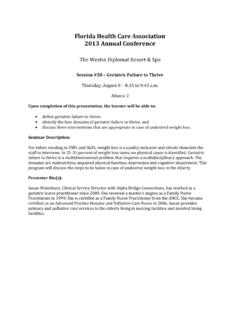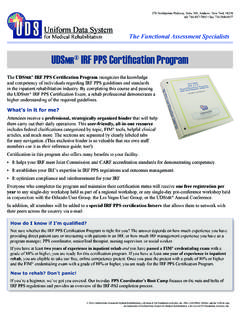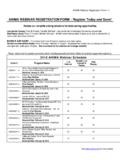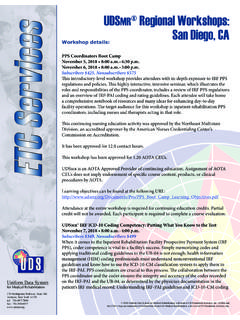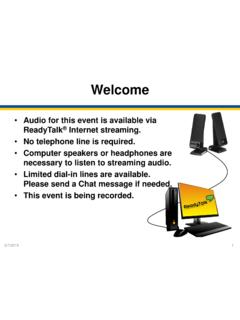Transcription of New MDS Section GG--Post Acute QM Triggers
1 New MDS Section GG--Post Acute QM Triggers Carol Maher, RN-BC, RAC-CT, CPC. Participants will identify the new MDS/Oasis/IRF-PI functional ADL. items. Participants will be able to list the proposed new Quality Measures that will be reported after the new functional ADL data has been collected. Participants will be able to explain strategies to successfully gather the needed data for the additional item set Section . IMPACT Improving Medicare post - Acute Care Transformation Act 2014. Requires CMS to make resident assessment items and Quality Measures data standardized across post - Acute settings. 1. Items will be standardized between LTCH, SNF, HH and IRF. Not all items will appear on all 3 assessment tools. IRF-PAE will include more items than MDS or LTCH. Admission to Medicare (first 3 days of new Medicare A stay). Discharge from Medicare (may be discharge date or end of Medicare Stay where A2400C.)
2 = end of Medicare stay). Required on admission to SNF PPS stay when A0310B = 1 SNF PPS 5-day MDS. Admission/5-day MDS. 5-day PPS MDS (can be combined with OBRA). Only required for traditional Medicare SNF. Part A stays. 2. GG0130. Self-Care (Assessment period is days 1 through 3 of the SNF PPS Stay starting with A2400B). Complete only if A0310B = 01. Although the 5-day MDS can have an ARD. any day from days 1-8, the look-back for Section GG is days 1-3 of the Medicare A. stay. Section GG is required on discharge from Medicare End of Medicare stay (A2400C). Complete only if: A0310G is not 2 (Unplanned discharge), AND. A0310H 1 (End of Medicare Stay = Yes), AND. A2400C (Medicare stay end date) minus A2400B. (Medicare A start date) is greater than 2 and A2100. is not 03 (Hospital). Discharge from Medicare new item set. May be combined with planned discharge (assumption). MDS look-back is the last 3 days of Medicare stay.
3 3. Must be completed when the resident's Medicare Part A stay ends, but the resident remains in the facility ( , is not physically discharged from the facility). For the Part A PPS Discharge assessment, the ARD. (Item A2300) is not set prospectively as with other assessments. The ARD (A2300) for a standalone Part A PPS. Discharge assessment is always equal to the End Date of the Most Recent Medicare Stay (A2400C) and is the same as the Discharge Date (A2000). The ARD may be coded on the assessment any time during the assessment completion period ( , End Date of Most Recent Medicare Stay (A2400C) + 14. calendar days). 10. If the resident's Medicare Part A stay ends and the resident is physically discharged from the facility, an OBRA Discharge assessment is required. If the End Date of the Most Recent Medicare Stay (A2400C). occurs on the day of or one day before the Discharge Date (A2000) of a planned discharge (A0310G=1), the OBRA.
4 Discharge assessment and Part A PPS Discharge assessment are both required and may be combined. When the OBRA and Part A PPS Discharge assessments are combined, the ARD (A2300) must be equal to the Discharge Date (A2000). The Part A PPS Discharge assessment may be combined with most PPS and OBRA- required assessments when requirements for all assessments are met (please see Section 11. Must be completed (Item Z0500B) within 14 days after the End Date of Most Recent Medicare Stay (A2400C + 14 calendar days). Must be submitted within 14 days after the MDS. completion date (Z0500B + 14 calendar days). Consists of demographic, administrative, and clinical items. If the resident's Medicare Part A stay ends and the resident subsequently returns to a skilled level of care and Medicare Part A benefits resume, the Medicare schedule starts again with a 5-Day PPS assessment. 12. 4. Functional Abilities and Goals - Discharge (End of SNF PPS Stay).)
5 GG0130. Self-Care (Assessment period is the last 3 days of the SNF PPS Stay ending on A2400C). 5. Standardized functional assessment items are included in the new Section GG of the Minimum Data Set (MDS) adopted for implementation starting October 1, 2016. These standardized items are used to collect data to calculate the adopted cross-setting quality measure intended to meet the IMPACT. Act requirement for measure domain: functional status, cognitive function, and changes in function and cognitive function. The quality measure (an application of Percent of SNF Residents with an Admission and Discharge Functional Assessment and a Care Plan that Addresses Function (NQF. #2631) relies on the collection of data using specific standardized items derived from the Continuity Assessment Record and Evaluation (CARE) Item Set. (continued). The number of Medicare Part A covered resident stays with functional assessment data Numerator for each self-care and mobility activity and at least one self-care or mobility goal The number of Medicare Part A covered Denominator resident stays 6.)
6 When a patient/resident has an incomplete stay, collection of discharge functional status data might not be feasible. For patients/residents with incomplete stays, admission functional status data and at least one treatment goal would be required, discharge functional status data would not be required to be reported. The standardized items included within the MDS do not duplicate existing items on the MDS currently in use for data collection on functional assessment. While many of the standardized items have labels that are similar to existing items on the MDS, there are several key differences between the two sets that may result in variation in the resident assessment results. Key differences include: (1) the data collection and associated data collection instructions;. (2) the rating scales used to score a resident's level of independence; and (3) the item definitions. 7. 1. Assess the resident's self-care status based on direct observation, the resident's self-report, family reports, and direct care staff reports documented in the resident's medical record during the 3-day assessment period, which is days 1 through 3, starting with the date in A2400B, Start of most recent Medicare stay.
7 2. Residents should be allowed to perform activities as independently as possible, as long as they are safe. 22. 3. For the purposes of completing Section GG, a helper is defined as facility staff who are direct employees and facility-contracted employees ( , rehabilitation staff, nursing agency staff). Thus, does not include individuals hired, compensated or not, by individuals outside of the facility's management and administration such as hospice staff, nursing/certified nursing assistant students, etc. Therefore, when helper assistance is required because a resident's performance is unsafe or of poor quality, only consider facility staff when scoring according to amount of assistance provided. 23. 4. Activities may be completed with or without assistive device(s). Use of assistive device(s) to complete an activity should not affect coding of the activity. 5. Residents should be coded performing activities based on their usual performance, or baseline performance, which is identified as the resident's usual activity/performance for any of the self-care or mobility activities, not the most independent or dependent performance over the assessment period.
8 Therefore, if there's fluctuation in the performance of activities during the three-day assessment, the performance wouldn't be the worst, and it wouldn't be the best, but it would be what's usual for that individual. 6. Refer to facility, Federal, and State policies and procedures to determine which staff members may complete an assessment. Resident assessments are to be done in compliance with facility, Federal, and State requirements. 24. 8. For the standardized items, the assessment period is three (3). calendar days. When resident functioning varies, the resident's usual performance would need to be reported on these standardized items. When resident functioning varies, the resident's usual performance over a three day period would need to be reported on these standardized items in contrast to the assessment and reporting of the resident's most dependent level of performance that occurs three or more times according to the rule of 3 (and the definition and coding exceptions) during a seven day period as is required in the MDS Section G.
9 Usual is defined as how the patient typically performs the activity during an assessment. The performance score is to be based on an assessment of the patient in which the patient is allowed to perform the activity as independently as possible, as long as he/she is safe. If the patient's self-care or mobility performance varies during the assessment period, report the patient's usual status, not the patient's most independent performance and not the patient's most dependent episode. The standardized items include 3 self-care activities and 9 mobility activities that are rated on a 6-level rating scale ranging from 6 meaning Independent to 1 that refers to dependent (Figure 1). A higher score on the rating scale means greater independence. 9. Complete only if A0310B = 01, PPS 5-day assessment or A0310G = 1, Planned and A0310H = 1, Part A PPS. Discharge. Code 06, Independent: if the resident completes the activity by him/herself with no assistance from a helper.
10 Code 05, Setup or clean-up assistance: if the helper SETS UP or CLEANS UP; resident completes activity. Helper assists only prior to or following the activity, but not during the activity. 10. to Lying: The helper places the bedrail in the upright position and the patient uses the bedrail to move from a sitting position to a lying position. Transfer: The helper places the patient's wheelchair next to the patient's bed and moves the wheelchair footrests out of the way so that patient can transfer into the wheelchair safely without supervision, cueing or physical assistance. Transfer: The helper provides a slide board to the patient and the patient uses the slide board to transfer from his bed to his wheelchair. The helper does not provide any supervision, cueing or physical assistance. Code 04, Supervision or touching assistance: if the helper provides VERBAL CUES or TOUCHING/STEADYING assistance as resident completes activity.



